- Network to gather data:
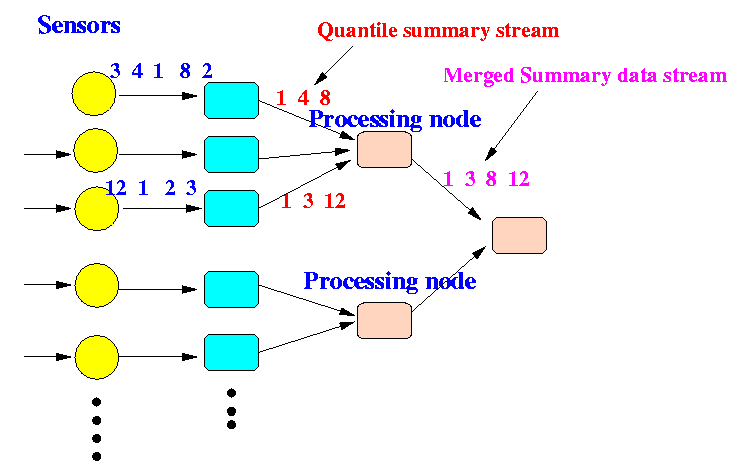
Description:
- Sensors gather data
(generate data stream)
- Each data stream is sent to a
processing node
- Goal:
- minimize power consumption (wireless devices) by compressing (summarizing) the quantile-summary
- Sensors gather data
(generate data stream)
- Function of a
processing node:
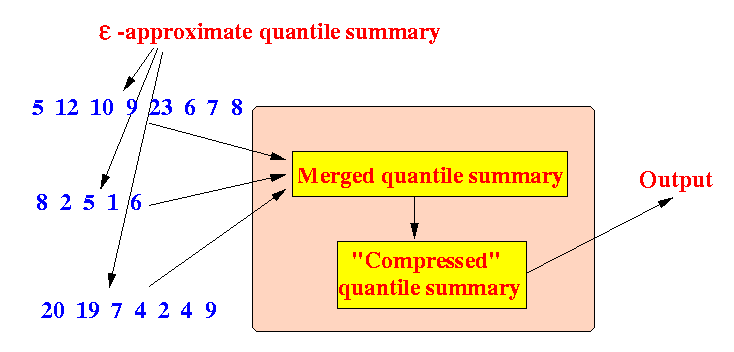
- Operation:
- A node receives
multiple quantile summaries
- It must form
one quantile summary
from the muliple summaries
- Then it must reduce the resulting summary into a quantile summary of size ≤ B+1 elements
- A node receives
multiple quantile summaries
- According to
Corollary 1
in the firet Greenwald-Ghanna
paper:
click here
- If at any time n,
the summary S(n)
satisfies the property:
-
maxall i ( gi + Δi )
≤
2 ε n
(Or: maxall i ( gi + Δi ) / 2 ≤ ε n )
then we can use the summary S(n) to answer any φ-quantile query within ε n precision
-
maxall i ( gi + Δi )
≤
2 ε n
- If at any time n,
the summary S(n)
satisfies the property:
- Relationship between
gi,
Δi,
rmin(vi)
and rmax(vi) :
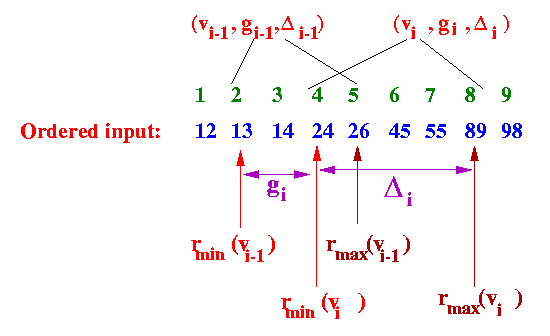
- Corollary 1
can be re-phrased as
follows: (See: click here )
- If at any time n,
the summary S(n)
satisfies the property:
- maxall i ( rmax(vi+1) - rmin(vi) ) ≤ 2 ε n
then we can use the summary S(n) to answer any φ-quantile query within ε n precision
- If at any time n,
the summary S(n)
satisfies the property:
- The merge operation
on
two ε-approximate quantile summaries
is as follows:
- Let the
two ε-approximate quantile summaries
be:
- Q' = (x1, x2, ... xa)
- Q'' = (y1, y2, ... yb)
- Let the combined result be:
- Q = (z1, z2, ... za+b)
- Each xi,
yi and
zi is of the form:
- (v, rmin, rmax)
- The Q = combine(Q', Q'')
is:
- Merge sort
the values v in
Q' and
Q''
- Assign rmin(v) and rmax(v) to the sorted values using the algorithm described next.
- Merge sort
the values v in
Q' and
Q''
- Let the
two ε-approximate quantile summaries
be:
- Assume:
- Q' = (x1, x2, ... xa)
- Q'' = (y1, y2, ...
yb)
- Q = (z1, z2, ... za+b) = combine(Q', Q'')
Without loss of generality, assume the element xr ∈ Q' is mapped to the element zi ∈ Q
- Let ys ∈ Q'' be largest value that is < xr
- Let yt ∈ Q'' be smallest value that is > xr
Then:
rminQ(zi) = rminQ'(xr) if ys is undefined rminQ(zi) = rminQ'(xr) + rminQ''(ys) otherwise
rmaxQ(zi) = rmaxQ'(xr) + rmaxQ''(ys) if yt is undefined rmaxQ(zi) = rmaxQ'(xr) + rmaxQ''(yt) - 1 otherwise
- The following notes will go through the
computation of
rminQ(zi)
and
rmaxQ(zi)
a little bit more slower with a concrete example...
- Case 1: the general case:
- xr ∈ Q'
- We can find a preceeding
and a succeeding
element in the other stream
- Let ys ∈ Q'' be largest value that is < xr
- Let yt ∈ Q'' be smallest value that is > xr
- Example:
- Q' = { 2:[1..1], 4:[3..4], 8:[5..6], 17:[8..8] }
-
Q'' = { 1:[1..1], 7:[3..3], 12:[5..6], 15:[8..8] }
- If xr = 8:[5..6] ∈ Q',
then:
- ys = 7:3..3] ∈ Q''
- yt = 12:5..6] ∈ Q''
- If xr = 7:[3..3] ∈ Q'',
then:
- ys = 4:3..4] ∈ Q'
- yt = 8:5..6] ∈ Q'
- xr ∈ Q'
- Suppose after merge sort,
the element
xr
become (renumbered)
the element
zi ∈ Q
Then the values rmin(zi) and rmax(zi) are defined as follows:
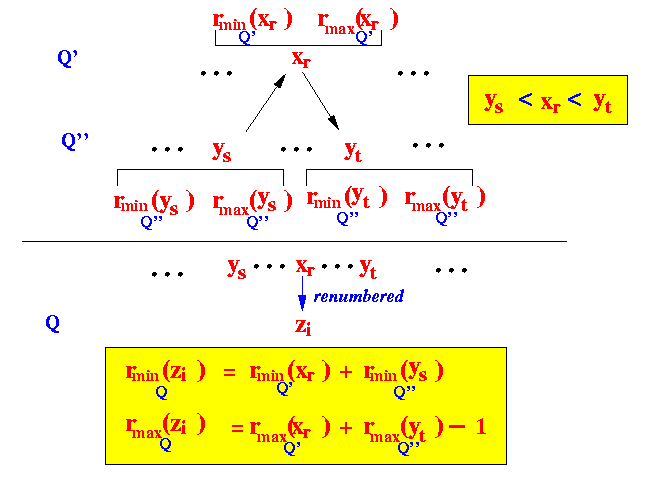
- Case 2: the no preceeding element:
- xr ∈ Q'
- We cannot find a
preceeding element
There are only succeeding elements in the other stream
- Let yt ∈ Q' be smallest (first) value that is > xr
- Example:
- Q' = { 2:[1..1], 4:[3..4], 8:[5..6], 17:[8..8] }
-
Q'' = { 1:[1..1], 7:[3..3], 12:[5..6], 15:[8..8] }
- If xr = 1:[1..1] ∈ Q'',
then:
- yt = 2:[1..1] ∈ Q'
- xr ∈ Q'
- Suppose after merge sort,
the element
xr
become (renumbered)
the element
zi ∈ Q
Then the values rmin(zi) and rmax(zi) are defined as follows:
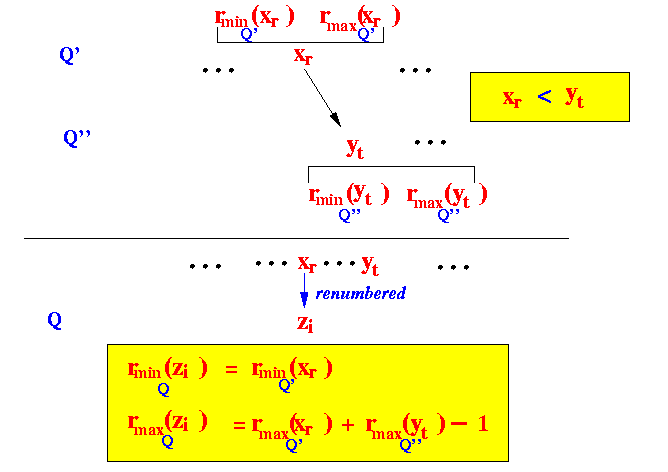
- Case 3: the no succeeding element:
- xr ∈ Q'
- We cannot find a
succeeding element
There are only preceeding elements in the other stream
- Let ys ∈ Q' be largest (last) value that is < xr
- Example:
- Q' = { 2:[1..1], 4:[3..4], 8:[5..6], 17:[8..8] }
-
Q'' = { 1:[1..1], 7:[3..3], 12:[5..6], 15:[8..8] }
- If xr = 17:[8..8] ∈ Q',
then:
- yt = 15:[8..8] ∈ Q''
- xr ∈ Q'
- Suppose after merge sort,
the element
xr
become (renumbered)
the element
zi ∈ Q
Then the values rmin(zi) and rmax(zi) are defined as follows:
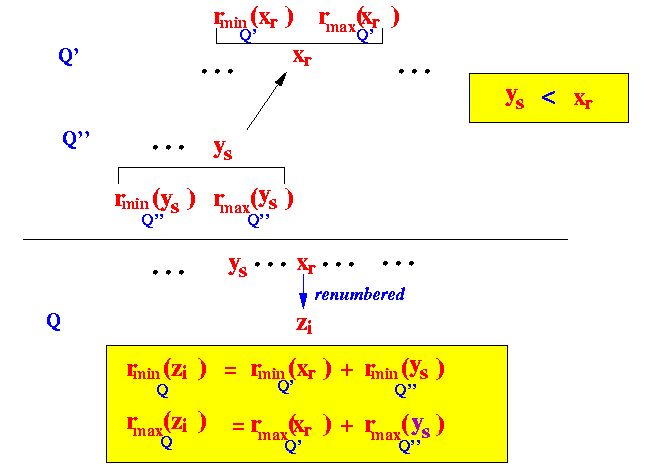
- Input sequences:
Rank: 1 2 3 4 5 6 7 8 Sorted Stream 1: 2 3 4 6 7 8 10 17 Sorted Stream 2: 1 4 7 9 11 12 13 15 Q' = { 2:[1..1], 4:[3..4], 8:[5..6], 17:[8..8] } Q'' = { 1:[1..1], 7:[3..3], 12:[5..6], 15:[8..8] } (Q' and Q'' are quantile summaries with εN = 3 According to (click here): g + Δ = rmax(vi) - rmin(vi-1) )
Merged stream: Rank: 1 2 3 4 5 6 7 8 9 10 11 12 13 14 15 16 1 2 3 4 4 6 7 7 8 9 10 11 12 13 15 17 Brown elements are from Stream 1 Red elements are from Stream 2
- Combine algorithm:
Input: Q' = { 2:[1..1], 4:[3..4], 8:[5..6], 17:[8..8] } Q'' = { 1:[1..1], 7:[3..3], 12:[5..6], 15:[8..8] }
Steps: rminQ(1) = rminQ''(1) = 1 rmaxQ(1) = rmaxQ''(1) + rmaxQ'(2) - 1 = 1 + 1 - 1 = 1
rminQ(2) = rminQ'(2) + rminQ''(1) = 1 + 1 = 2 rmaxQ(2) = rmaxQ'(2) + rmaxQ''(7) - 1 = 1 + 3 - 1 = 2
rminQ(4) = rminQ'(4) + rminQ''(1) = 3 + 1 = 4 rmaxQ(4) = rmaxQ'(4) + rmaxQ''(7) - 1 = 4 + 3 - 1 = 6
rminQ(7) = rminQ''(7) + rminQ'(4) = 3 + 3 = 6 rmaxQ(7) = rmaxQ''(7) + rmaxQ'(8) - 1 = 3 + 6 - 1 = 8
rminQ(8) = rminQ'(8) + rminQ''(7) = 5 + 3 = 8 rmaxQ(8) = rmaxQ'(8) + rmaxQ''(12) - 1 = 6 + 6 - 1 = 11
rminQ(12) = rminQ''(12) + rminQ'(8) = 5 + 5 = 10 rmaxQ(12) = rmaxQ''(12) + rmaxQ'(17) - 1 = 6 + 8 - 1 = 13
rminQ(15) = rminQ''(15) + rminQ'(8) = 8 + 5 = 13 rmaxQ(15) = rmaxQ''(15) + rmaxQ'(17) - 1 = 8 + 8 - 1 = 15
rminQ(17) = rminQ'(17) + rminQ''(15) = 8 + 8 = 16 rmaxQ(17) = rmaxQ'(17) + rmaxQ''(15) = 8 + 8 = 16
- Conclussion:
Combined stream: Rank: 1 2 3 4 5 6 7 8 9 10 11 12 13 14 15 16 1 2 3 4 4 6 7 7 8 9 10 11 12 13 15 17Summary:
Q = 1:[1..1] 2[2..2] 4[4..6] 7[6..8] 8[8..11] 12[10..13] 15[13..15] 17[16..16] Max( rmax(vi) - rmin(vi-1) ) = 5 !!! However: N = 16, so εN is also twice as large !!!
- You can verify that the merged summary is an εN quantile summary of the merged stream !!!
- Lemma 1:
- Let
Q' be
a
ε'-approximate quantile summary
for a set of values S'
- Let
Q'' be
a
ε''-approximate quantile summary
for a set of values S''
- Then
Q = combine(Q', Q'')
produces an
ε-approximate quantile summary
for the set of values S' ∪ S'' with
-
ε =
max( ε' , ε'' )
- Let
Q' be
a
ε'-approximate quantile summary
for a set of values S'
- Proof:
- Let:
n' = | S' | and
n'' = | S'' |
- Consider two
arbitrary consecutive
elements in Q':
- zi and
- zi+1
By Corollary 1, we must show that:
- rmaxQ(zi+1) − rminQ(zi) ≤ 2 ε (n' + n'')
- The proof is split
into 2 cases:
- Case 1:
zi
and
zi+1
are
elements in the same set
- Case 2: zi and zi+1 are elements in the different sets
- Case 1:
zi
and
zi+1
are
elements in the same set
- Let:
n' = | S' | and
n'' = | S'' |
- Proof of case 1:
zi
and
zi+1
are
elements in the same set
- Assume the values came from the set Q'
Because there no value between zi and zi+1, the values that map into zi and zi+1 must be consecutive values in Q'
- Assume that the elements
xr and
xr+1
in Q'
mapped into
zi
and
zi+1
Q': .... xr xr+1 ... | | V V Q: .... zi zi+1 .... - Let:
- ys
be the
largest element ∈ Q'' that is < xr
- yt be the smallest element ∈ Q'' that is > xr+1
Situation:
Q'': ... ys yt ... Q': .... xr xr+1 ... | | V V Q: .... zi zi+1 ....
- ys
be the
largest element ∈ Q'' that is < xr
- Fact:
- ys and
yt
are
consecutive elements
in Q''
Because if there is an element between ys and yt, this element would come between xr and xr+1 !!!
- ys and
yt
are
consecutive elements
in Q''
- By the definition of
rminQ(zi):
rminQ(zi) = rminQ'(xr) if ys is undefined rminQ(zi) = rminQ'(xr) + rminQ''(ys) otherwise Hence: rminQ(zi) ≥ rminQ'(xr)And by the definition of rmaxQ(zi+1):
rmaxQ(zi+1) = rmaxQ'(xr+1) + rmaxQ''(ys) if yt is undefined rmaxQ(zi+1) = rmaxQ'(xr+1) + rmaxQ''(yt) - 1 otherwise Since: rmaxQ''(yt) > rmaxQ''(ys) We have: rmaxQ(zi+1) ≤ rmaxQ'(xr+1) + rmaxQ''(yt) - 1
- Therefore
rmaxQ(zi+1) − rminQ(zi) ≤ [rmaxQ'(xr+1) + rmaxQ''(yt) - 1] - rminQ'(xr) = [rmaxQ'(xr+1) - rminQ'(xr)] + [rmaxQ''(yt) - 1] ≤ [rmaxQ'(xr+1) - rminQ'(xr)] + [rmaxQ''(yt) - rminQ''(yt-1)] (rminQ''(yt-1) ≥ 1 !) ≤ &epsilon'n' + &epsilon''n'' ≤ &epsilon n' + &epsilon n'' = &epsilon (n' + n'')
- Assume the values came from the set Q'
- Proof of case 2:
zi
and
zi+1
are
elements in different sets
- Assume that:
- zi corresponds to xr ∈ Q'
- zi+1 corresponds to yt ∈ Q''
Situation:
Q': .... xr ... Q'': .... yt ... | | V V Q: .... zi zi+1 ....Because there no value between zi and zi+1, we have that:
- xr is the largest value ∈ Q' that is < yt ∈ Q'' and,
- yt is the smallest value ∈ Q'' that is > xr ∈ Q'
- Moreover:
Q': .... xr xr+1 ... Q'': .... yt-1 yt ... | | V V Q: .... zi zi+1 ....We also have:
- xr+1 is the smallest value ∈ Q' that is > yt ∈ Q'' (if xr+1 exists) and,
- yt-1 is the largest value ∈ Q'' that is < xr ∈ Q' (if yt-1 exists)
- By the definition of
rminQ(zi):
rminQ(zi) = rminQ'(xr) if ys is undefined rminQ(zi) = rminQ'(xr) + rminQ''(yt-1) otherwise Hence: rminQ(zi) ≥ rminQ'(xr)And by the definition of rmaxQ(zi+1):
rmaxQ(zi+1) = rmaxQ''(yt) + rmaxQ'(xr) if xr+1 is undefined rmaxQ(zi+1) = rmaxQ''(yt) + rmaxQ'(xr+1) - 1 otherwise Since: rmaxQ'(xr+1) > rmaxQ'(xr) We have: rmaxQ(zi+1) ≤ rmaxQ''(yt) + rmaxQ'(xr+1) - 1
- Therefore
rmaxQ(zi+1) − rminQ(zi) ≤ [rmaxQ''(yt) + rmaxQ'(xr+1) - 1] - rminQ'(xr) = [rmaxQ'(xr+1 - rminQ'(xr)] + [rmaxQ''(yt) - 1] ≤ [rmaxQ'(xr+1) - rminQ'(xr)] + [rmaxQ''(yt) - rminQ''(yt-1)] (rminQ''(yt-1) ≥ 1 !) ≤ &epsilon'n' + &epsilon''n'' ≤ &epsilon n' + &epsilon n'' = &epsilon (n' + n'')
- Assume that:
- Corollary 1:
- Let Q1,
Q2, ...,
Qk
be quantile summaries such that:
-
Qi is
an
εi-approximate quantile summary
of a set Si
- Then:
- Let Q
be a quantile summary produced by
repeated applying the
combine() operation
(defined above) on
Q1,
Q2, ...,
Qk
- Then, regardless of the sequence in which
the combine() operation
was applied,
Q
is an
ε-approximate quantile summary
of the set:
-
S =
&cupi=1..k( Si )
-
ε =
mini=1..k( εi )
- Let Q
be a quantile summary produced by
repeated applying the
combine() operation
(defined above) on
Q1,
Q2, ...,
Qk
- Let Q1,
Q2, ...,
Qk
be quantile summaries such that:
- Recall
how to use an ε-approximate
quantile summary,
to
answer a
quantile queries:
- Given a quantile query
for the element that
ranks at the rth position
- Compute ⌊ ε × N ⌋
- If r ≥
N - ⌊ ε × N ⌋,
return
vs-1
as answer
- If r <
N - ⌊ ε × N ⌋,
then:
- Find the first the smallest (first)
value
rmax(vj)
that is larger
than
r + ⌊ ε × N ⌋
- Return the value vj-1
- Find the first the smallest (first)
value
rmax(vj)
that is larger
than
r + ⌊ ε × N ⌋
- Given a quantile query
for the element that
ranks at the rth position
- Although the combine() operation
produce an
ε-approximate quantile summary,
the size of the result
is the
sum of the original sets
We may want to cut down on the number of entries used in the summary...
- The prune operation
can
reduce the size of a quantile summary
to a size of
at most B+1 entries
However, the reduction comes with at a cost:
- increased error margin
- The prune operation:
Input: S = quantile summary B = parameter
QSummary Prune(QSummary S, int B) { QSummary R = ∅; // Result quantile summary for ( i = 1, (1/B)×|S|, (2/B)×|S|, (3/B)×|S|, ..., |S| ) { v = Query( S, i ); // Find the element at given ranking rmin( v ) = rmin( v ) in summary S; rmax( v ) = rmax( v ) in summary S; R = R ∪ { (v, rmin( v ), rmax( v ) } ; } return(R); }
- Lemma 2:
- Let Q' be an
ε'-approximate quantile summary
of the set S
- Then Prune(Q', B) will return a (ε' + 1/(2B))-approximate quantile summary of the set S
- Let Q' be an
ε'-approximate quantile summary
of the set S
- Proof
- Consider each secussive pair
of elements
qi
and
qi+1
in
Prune(Q', B):
- rmin( qi )
= rmin( qi )
in summary Q';
- rmax( qi+1 ) = rmax( qi+1 ) in summary Q';
- rmin( qi )
= rmin( qi )
in summary Q';
- Then:
qi qi+1 ^ ^ | | 1 (1/B)×|S| (i/B)×|S| ((i+1)/B)×|S| |S| |----------|-- .... ---|----------|----------|--- .... ----|----------| |<-------->| |S|/B / \ / \ / \ enlarged.... / \ / \ qi qi+1 ---|----|----|----|----|----|----|----|----|----|----|--- Q': vk vk+1 ... vm qi ranks # (i/B)×|S| qi+1 ranks # ((i+1)/B)×|S| - Assume that:
- Element vk ranks # qi in set Q'
- Element vm ranks
# qi+1 in
set Q'
- Note that:
-
m − k ≤
(i/B)×|S|
- Recall that:
-
rmin(vi) −
rmin(vi-1)
=
gi
(See:
click here )
- gi = number of value covered by the entry vi
-
rmin(vi) −
rmin(vi-1)
=
gi
(See:
click here )
- Then:
rmax( qi+1 ) - rmin( qi ) = rmax( vm ) - rmin( vk ) = rmax( vm ) + + rmin( vm-1 ) - rmin( vm-1 ) + rmin( vm-2 ) - rmin( vm-2 ) + .... + rmin( vk+1 ) - rmin( vk+1 ) - rmin( vk ) rmax( qi+1 ) - rmin( qi ) = rmax( vm ) - rmin( vm-1 ) + rmin( vm-1 ) - rmin( vm-2 ) + rmin( vm-2 ) - rmin( vm-3 ) + .... + rmin( vk+2 ) - rmin( vk+1 ) + rmin( vk+1 ) - rmin( vk ) rmax( qi+1 ) - rmin( qi ) = rmax( vm ) - rmin( vm-1 ) + gm-1 + gm-2 + ... + gk+1
- Because Q' is a
ε'-approximate
quantile summary, we have that:
rmax( vm ) - rmin( vm-1 ) ≤ 2&epsilon'|S|
- The sum
gm-1 + gm-2 + ... + gk+1
is
number of elements
covered by the entries
vm-1, vm-2, ... , vk+1
This sum is ≤ (1/B)×|S|
- Therefore:
rmax( qi+1 ) - rmin( qi ) ≤ 2&epsilon'|S| + (1/B)×|S| = 2 ( &epsilon' + 1/(2B)) × |S|
- Consider each secussive pair
of elements
qi
and
qi+1
in
Prune(Q', B):